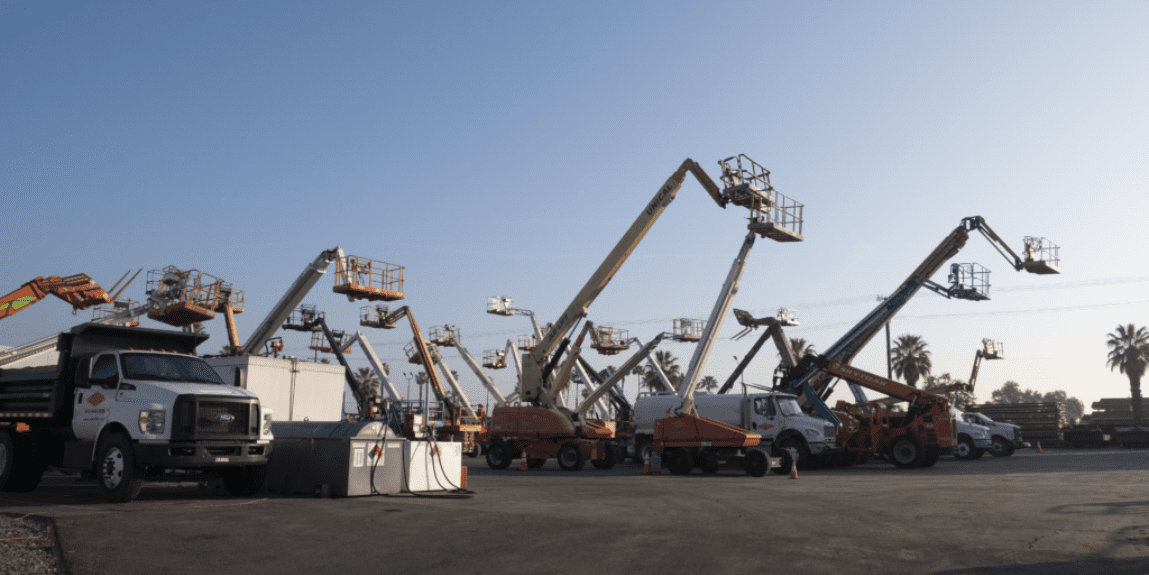

Any business or organization that depends on a fleet of vehicles or equipment for its operations will need some level of fleet management. In fact, according to an annual survey by Government Fleet, over 75% of fleet managers use telematics or management software to assist them with their equipment and vehicles.
But what is fleet management, what does it entail, and how can a company improve its fleet operations? The following guide is your one-stop shop.
From a review of definitions to a Q&A with the experts, this guide will help you understand fleet management, how it works, why it’s important, and how to choose the best management system for your business.
While fleet management involves a number of different aspects, put simply, it’s the task of acquiring the right vehicles/equipment, taking care of all the vehicles used and ensuring they continue to run smoothly until their eventual disposal. A fleet manager (a vehicle shepherd of sorts) conducts these duties.
There are countless advantages to managing a fleet well. Here are some of the main ones:
Preventative maintenance schedules help minimize breakdowns, save money on expensive repairs and prolong the lifespan of the vehicles.
Route optimization reduces wasted fuel and minimizes idling, potentially saving thousands of dollars in fuel costs. For on-road fleets, managers can view data to find the fastest routes for their drivers, reducing time on the road and gas used.
Real-time equipment tracking helps prevent theft and unauthorized use. According to experts, the industry experiences hundreds of millions to $1 billion worth of losses each year. Effective management improves asset protection, keeping vehicles on their rightful lots and business owners at peace.
Implementing management software allows time-consuming, manual tasks to be automated to save time.
Overall, having a handle on a fleet frees managers and business owners to focus on delivering better service to their customers.
Owning a car isn’t cheap — imagine owning an entire fleet of trucks, off-road equipment, and other vehicles. Maintenance, repairs, and fuel costs, especially for complex equipment like those used in construction, add up.
The easiest way for businesses to make money is to save it where possible. Good management helps businesses analyze ways to eliminate inefficiencies, reduce operating costs, and protect company assets.
Most people may only consider commercial vehicles or public transit as “fleets”. However, several other industries require and depend on expert management, including:
Effective management requires a manager or management team. Fleet managers are responsible for maintaining a fleet and keeping costs low. They oversee everything from initial acquisition to eventual disposal of a vehicle or piece of equipment.
Responsibilities include ensuring proper performance, fuel management, and maintenance of each vehicle or piece of equipment during its working life. They track vehicles and try to find ways to reduce the cost of fleet operations.
Fleet managers also play a role in training and directing the drivers/operators and keeping them safe. They ensure drivers operate the vehicles safely, implement programs to train them on usage practices, and ensure the company stays compliant with government regulations.
Management isn’t easy, especially when it involves keeping track of the location and status of hundreds of assets across a large geographical area. Fleet managers face several obstacles, including:
How does fleet management work to smoothen a company’s overall operations? Typically, with industry best practices and a comprehensive system or software. Here’s a breakdown of a few features:
Real-time location tracking enhances theft prevention and optimizes the utilization of assets across job sites. GPS increases visibility, helping managers improve operational efficiency and plan efficient routes to reduce fuel consumption. This lets businesses deliver better, more reliable customer service.
Management systems help workers stay compliant with government and safety regulations, fostering a culture of responsibility. Monitoring driving behaviors like speed and excessive braking helps keep workers, communities, and vehicles safe.
Optimized routes not only reduce expenses but also minimize a company’s carbon footprint. These efforts enhance employee welfare, reduce potential liabilities, and foster public trust.
A well-maintained fleet operates more reliably and has a higher resale value due to a well-documented history. Software with usage data and predictive engine analytics lets managers schedule appointments before breakdowns happen, reducing downtime, minimizing accidents, and increasing profitability.
Usage reports also show how assets are used, guiding purchase decisions on which equipment is worth investing in for the future. Managers can also interpret this data to reallocate assets that aren’t used as much.
An expense tracking system enables businesses to maintain detailed records of all fleet-related costs, making it easier to identify cost-saving opportunities. This includes everything from fuel and maintenance to insurance and license fees.
The best way to manage a fleet effectively is with an efficient management system.
Traditionally, jobs were done on pen and paper, with manual tracking and reactive maintenance. Fortunately, the influx of technology has brought faster, more efficient solutions for everything, including managing fleets.
Fleet management software is essential for fleet-based companies hoping to boost productivity by automating their processes. Here are a few tips on choosing the right software for your business:
If you’re looking for management software for your business or organization, look no further than Trackunit. With unparalleled connectivity, seamless integration, and real-time analytics, Trackunit gives you everything you need in a single platform solution.
Our Trackunit Go app solution is accessible on your smart device or tablet. It gives team members more control and instant access to all critical information on a virtual dashboard.
Our system lets you identify usage trends so you can invest in what’s on-demand. Seamless integrations with your existing ERP system help your team manage the bigger picture and drive your company forward.
Discover what works best for your business — request a demo today. Trackunit – better connectivity for better productivity and minimal downtime.
To work effectively, management teams need a qualified fleet manager and a suitable (software) system to support efficiency and productivity. Software tools locate inefficiencies to continuously improve processes.
A fleet management plan is an all-inclusive strategy created to reduce operational costs and optimize performance. The software tool helps streamline maintenance, driver safety, compliance, and workflow.
Yes, fleet management is an integral component of construction logistics (the process of planning the workers and resources necessary for a construction job). Fleet management ensures teams have the equipment and vehicles they need to get projects done right.
Fleet operations are the day-to-day activities of a fleet and its drivers or operators; fleet management is much broader and involves the strategic management of these operations in addition to acquisition, maintenance, safety, and efficiency.
Never miss an insight. We’ll email you when new articles are published on this topic.
